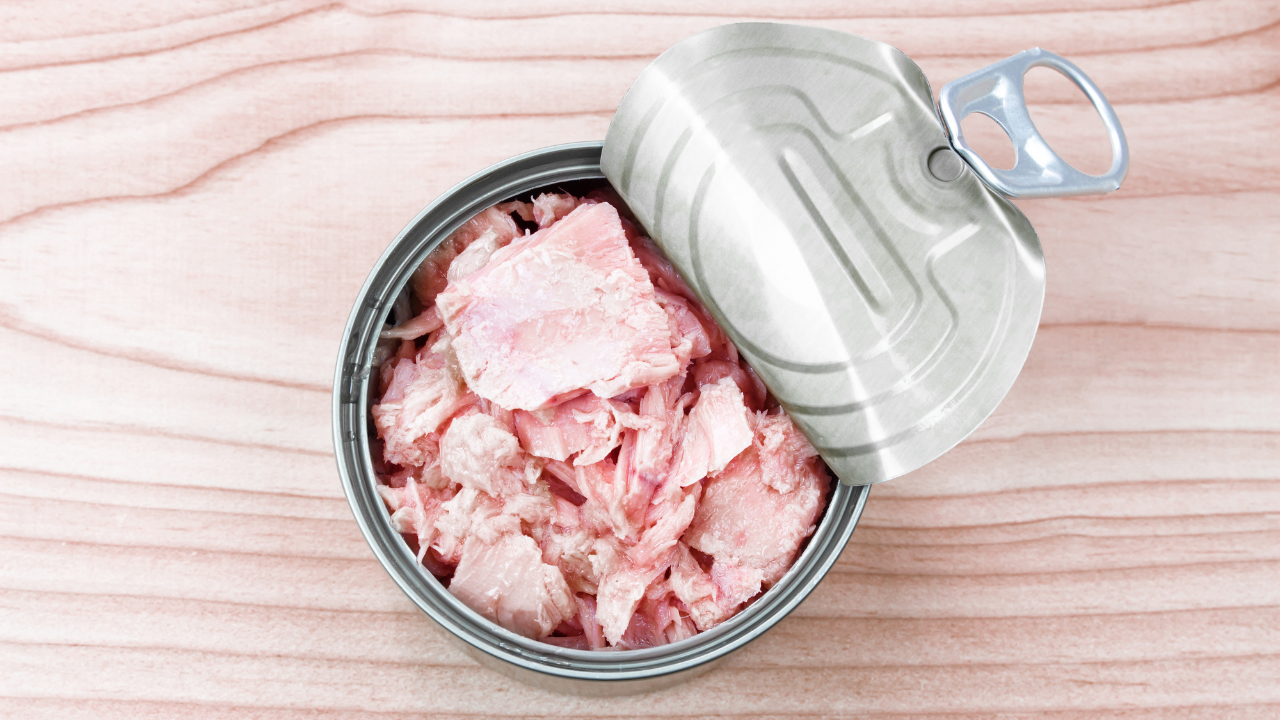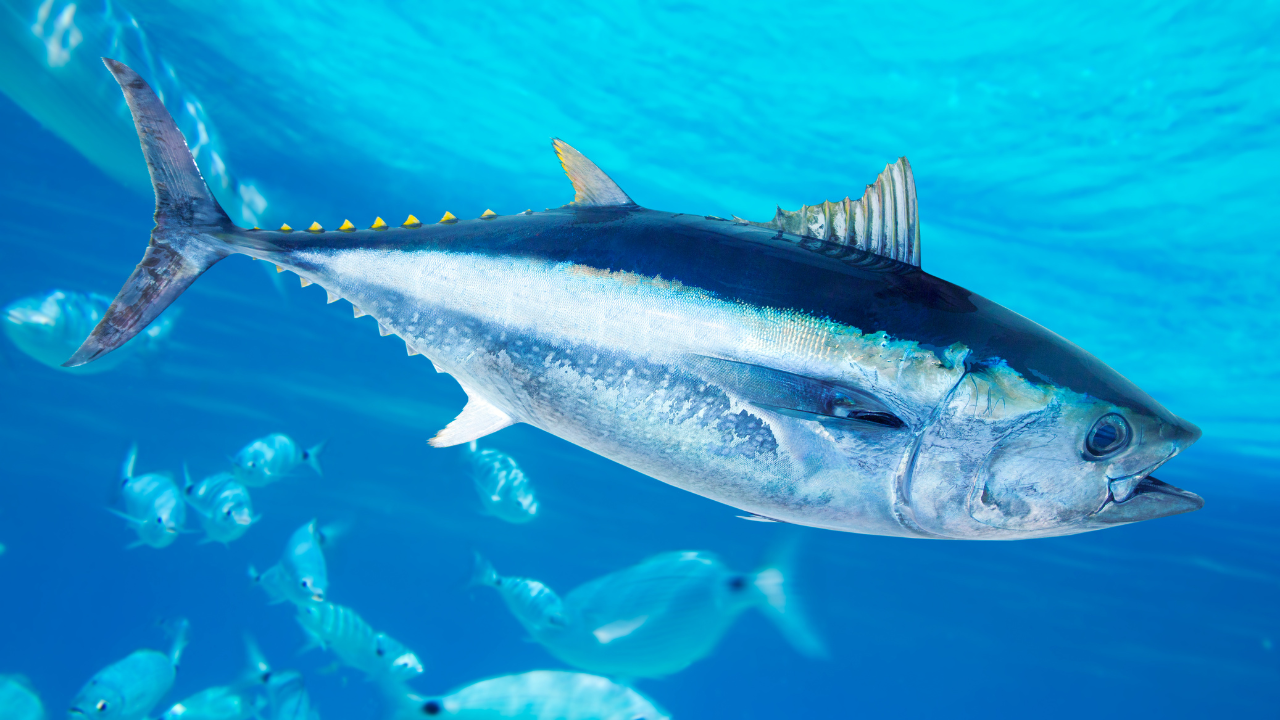Tuna: Is it Thyroid Safe?

To tuna, or not to tuna? That is the question.
Canned tuna can be a great source of Omega 3s and other thyroid-supportive nutrients, but with mercury concerns, can it be a thyroid-safe food? How do we choose wisely when it comes to this convenient protein source? And which brands are best for Thyroid Thrivers looking for safe tuna?
We'll cover all of that in this blog post and episode of Thyroid-healthy Bites.
We'll cover:
- The Pros & Cons of Tuna
- The Problem with Mercury & Your Thyroid
- 7 Ways to Protect Your Thyroid from Mercury Toxicity
- Is Tuna Right for YOU?
- Can the Selenium in Tuna Protect Us from the Mercury In Tuna?
- How to Choose Thyroid-friendly Tuna
- The Top 3 Thyroid-friendly Tuna Brands
Full disclosure: Some of the links in this post may be affiliate links. As an Amazon Associate, I earn from qualifying purchases. Purchasing a product using one of these links will support my work at no additional cost to you. Please know that I only recommend products I wholeheartedly stand by.
Disclaimer: This information is for educational and inspirational purposes only. Always consult with your doctor or other qualified healthcare providers before making changes to your diet, health care, or exercise regimen.
Podcast Links:
- FREE Thyroid-healthy Grocery Guide
- Listen on the podcast page
- Subscribe on iTunes
- Follow on Spotify
- Subscribe on YouTube
- Subscribe on Google Podcasts
- Subscribe on Amazon Music
- Listen on Stitcher
The Pros & Cons of Tuna
Tuna is higher in anti-inflammatory Omega 3s (including brain and eye-supportive DHA) than many other types of fish. It provides an excellent source of protein, which is required for healthy thyroid function, metabolism, and muscle building. Tuna is also a good source of several key thyroid-supporting vitamins and minerals like vitamin D, selenium, and iodine.
1 (5 oz.) can of Tuna, packed in water, contains*:
- 35 g protein
- 120 calories
- 0 grams carbohydrate
- 2 grams fat
- Omega 3s:
- 280 mg DHA
- 40 mg EPA
- Several other vitamins and minerals including calcium, iron, vitamin A, B vitamins, niacin, potassium, selenium, and thiamin.
*Nutrition varies from brand to brand and species to species.
Those Omega 3 fatty acids in canned tuna get the nutritional spotlight. Fatty acids support all cells, including our thyroid cells. According to thyroid expert Dr. Amy Myers, a deficiency in Omega 3s (which is the norm for most Americans) can result in increased inflammation. This can, in turn, trigger the autoimmune response for those of us with Hashimoto's or Graves' Disease and lead to an increase in anti-thyroid antibodies.
While there is currently no RDA for Omega 3s, most health organizations recommend 250 - 500 mg of combined (DHA + EPA) Omega 3s per day. Just 1 can of tuna can provide that, especially if you're buying high-quality canned tuna (more on that below).
While tuna has a lot of thyroid-friendly qualities, it's also no secret that tuna has been red-flagged due to concerns about mercury.
While nearly all fish contains some mercury, some types of fish tend to accumulate more mercury than others, especially if they eat other fish and have a longer lifespan. Tuna falls into this category and contains a relatively high level of mercury compared to other kinds of fish.
The amount of mercury varies widely in tuna depending on size, species, and location, but the prevalence of mercury in tuna is enough to warrant FDA guidelines regarding tuna consumption, especially for children, those who are pregnant, and those who wish to become pregnant.
Another significant issue with tuna, especially mainstream, commercially processed tuna, is detrimental fishing practices. Rampant overfishing has decimated tuna populations in many parts of the world. Harmful practices like purse seines, long lines, and the use of Fish Aggregating Devices (FADs) lead to the waste of other types of marine life, which get brought onto the boats as "bycatch" and are ultimately discarded.
The good news for health-conscious consumers (like you and me) is that there are a handful of safe, sustainable, and healthy choices among tuna brands. If we can minimize the mercury, which often seems to correlate with more sustainable fishing practices, tuna has a lot to offer, nutritionally speaking.
For Thyroid Thrivers, low-mercury tuna is best. In the next section, we'll discuss why that is. Then, I'll share some specific low-mercury brands you can look for.

The Problem with Mercury and Your Thyroid
Let's not be flip about this: As Thyroid Thrivers, mercury and other heavy metals are bad news.
The reason the thyroid is especially vulnerable to the accumulation of heavy metals is that the thyroid metabolizes things quickly; therefore, more toxins pass through it. Sometimes those toxins are so chemically similar to iodine, which is utilized by the thyroid to make thyroid hormone, that the thyroid absorbs them.
Mercury, in particular, is a known thyroid toxin and trigger. Part of what makes these heavy metals so problematic is that they build up in our tissues over time. As our "bioaccumulation" (or body-load) of mercury increases as we age, it has the potential to trigger things like cancer, autoimmune thyroiditis, and oxidative damage to the thyroid, all of which can contribute to hypothyroidism.
If you have Hashimoto's (and if you have hypothyroidism, you likely do have Hashi's), studies have shown a direct link between mercury exposure and an increase in thyroid antibodies.
Further Reading: Why You Should Get Tested for Hashimoto's
The sad truth is that it's impossible to avoid mercury altogether in today's world. It's everywhere, including the food we eat, the air we breathe, and the water we drink. Our planet is suffering its own bioaccumulation of mercury.
While mercury is naturally occurring, our current level of systemic mercury pollution is largely a result of the burning of fossil fuels like coal, oil, and natural gas, which emit mercury as a byproduct. While most of us can't do much about systemic mercury pollution (besides voting), there are choices we can make to minimize our exposure to and consumption of mercury.
6 Ways to Protect Your Thyroid from Mercury Toxicity:
- Purchase a high-quality water filter that removes heavy metals
- Eat (or supplement with) adequate selenium, which protects the thyroid from mercury toxicity
- Avoid mercury amalgam fillings
- Avoid smoking and second-hand smoke
- Incorporate more chelating foods like cilantro and turmeric
- Carefully select which types of fish to consume
Is Tuna Right for You?
At this point, you may be thinking, "YIKES! Is tuna even worth it?"
This is an appropriate response after what we've covered so far. You can always opt-out on tuna, but here's the thing: you don't necessarily have to. There's more to this story, as you're about to learn.
As with so many other facets of thyroid-healthy eating, whether or not to eat tuna isn't a YES or NO issue. Its an 'IT DEPENDS' issue. It's about gathering the information you need to make the best choices for your health so that you can eat tuna safely and with peace of mind if you so choose.
Bottom line: To protect your thyroid and overall health, purchase low-mercury tuna from trustworthy brands and eat in moderation, meaning no more than 1 to 3 times per week according to the guidelines.
Personally, as a Hashimoto's patient, I consume tuna no more than 1 to 3 times per month, opting for other types of lower-mercury fish, like wild salmon, most of the time.
What Can I Substitute for Tuna?
Are you OUT on tuna? If you've gotten this far down the page and are feeling like tuna just isn't worth the risk, there's an easy solution: substitute canned wild salmon. It has a similar taste and provides a healthy dose of those Omega 3s, with far less mercury. (Nearly all fish and shellfish contain some mercury.)
Still here and considering your options? If you're curious about how to enjoy your beloved tuna salad without harming your health, I got you covered! Let's get to the good news and explore ways you can enjoy tuna (and its health benefits) with the greatest possible peace of mind.

Can the Selenium in Tuna Protect Us From the Mercury in Tuna?
It may. This is one lesser-known bright side to tuna and is worthwhile food for thought, so listen up.
Tuna happens to be particularly high in selenium. A 3-ounce serving of tuna contains approximately 77 mcg or 140% of the recommended daily value of selenium. That's significant!
Selenium plays a protective role for your thyroid when it comes to mercury. Selenium supplementation has been shown to reduce the toxicity of mercury and also has protective antioxidant effects on the thyroid.
Selenium is actually supportive to the thyroid in several ways. Getting adequate selenium may improve your quality of life, reduce your autoimmune antibodies, and even reduce your need for thyroid medication.
So, now that we understand that selenium is beneficial to the thyroid, let's connect the dots between selenium, mercury, and tuna.
Studies have shown that the selenium in tuna may lessen the danger posed to humans by the mercury found in said tuna.
One thing to note is that this mechanism seems to work best within the selenium and mercury makeup of the tuna itself-- as opposed to putting selenium supplements on top of high-mercury foods, which isn't as effective. Make sense?
Avoiding a selenium deficiency is good practice for Thyroid Thrivers who want to protect their thyroid from the detrimental effects of mercury exposure from any source. Selenium deficiency can be prevented through the foods we eat or supplementation.
NOTE: Selenium toxicity can occur if too much is consumed. More is not necessarily better. Talk to your doctor about whether selenium supplementation is right for you and at what dosage.
It's well-established that selenium helps protect the thyroid from mercury. Some experts who have studied the nutritional relationship between selenium and mercury in fish, like Chris Kresser, feel that the selenium in tuna cancels out the mercury. This also applies to most other types of commonly consumed fish, which also contain selenium (along with some amount of mercury).
Current FDA and EPA guidelines may conflict, but Kresser points out that those guidelines are based on weak and insufficient evidence. He also questions the nutritional harm those guidelines may be doing by suggesting we limit our consumption of fish.
Environmental harm is another topic in terms of our planet's fisheries, but he states that "Studies of pregnant women consuming seafood show benefits, not harm-- as long as the fish contain more selenium than mercury."
Conflicting evidence runs rampant in the world of nutrition, but it seems clear that looking only at mercury content in fish without considering the role the selenium in fish plays is inarguably incomplete.
Something to ponder...but alas, such pondering doesn't help us pick a new brand of tuna we can feel good about buying at the store TODAY! Let's do that next.
How to Choose Thyroid-Friendly Tuna
It's important to choose wisely when it comes to eating tuna. Between harmful fishing practices, sustainability concerns, and mercury concerns, there's a small triangle in the middle of this Venn diagram where we can find the right kind of tuna.
To minimize your consumption of mercury, the FDA recommends opting for canned "light" tuna, as opposed to canned albacore (or white) tuna, citing that the latter contains 3x as much mercury.
This simple rule of thumb may be helpful in terms of choosing lower-mercury tuna. Still, it should be noted that it does not factor in sustainability concerns or fishing practices that can be utilized to catch lower-mercury tuna.
If you're going to buy the big commercial brands of canned tuna, opting for "light" tuna as opposed to albacore may be the lesser of two evils, but if you truly want the best, safest, most sustainable, and most nutrient-dense tuna money can buy, we have to drill deeper.
First, let's cover some criteria to look for when shopping for canned tuna. Then, we'll get to my hand-picked favorites.
Things to Keep in Mind When Shopping for Canned Tuna:
NOTE: The criteria below eliminate the vast majority of big-brand, commercially-available canned tuna.
- Look for pole or troll-caught brands that are endorsed by reputable third parties
- Avoid tuna caught using long-line or FADs (Fish Aggregating Devices)
- Look for BPA-free cans or glass jars to reduce your exposure to hormone-disrupting chemicals
- Read labels carefully, as many mainstream brands that advertise tuna packed "in water" are actually packed in a soy-based vegetable broth. (Soy is not ideal for Thyroid Thrivers, according to leading experts.)
- To retain those beneficial Omega 3s, look for tuna that is cooked only once in the can (including the brands listed below). Most conventional brands are cooked twice: First, prior to canning, whereby beneficial nutrients, flavor, and Omega 3 fats drain from the fish and are discarded, and then second, they're cooked again in the can, sometimes in soy-laden "vegetable" broth or with other additives.
- When preparing high-quality tuna, like the brands listed below, don't drain your tuna. Instead, stir the Omega-3-rich liquid and the tuna together to moisten the fish and maximize its nutrition content.
My Top 3 Thyroid-friendly Tuna Brands:
- Safe Catch Elite Pure Wild Tuna: This canned tuna wears the biggest halo of all and carries a strong endorsement from the American Pregnancy Association. Safe Catch invented technology that tests every single tuna for mercury content. Their "Elite" product is the only brand on the market that meets Consumer Reports' low-mercury criteria. In addition, their processing methods retain 100% of the nutrients found in the whole fish, whereas common processing methods cook out up to 80% of those beneficial Omega 3s before the tuna even hits the can! Safe Catch is also committed to sustainable fishing practices.
- Wild Planet Tuna, especially Skipjack: All varieties of Wild Planet tuna are sustainably caught using practices that only reel in smaller fish that are naturally lower in mercury content. Thorough testing has convinced the folks at Wild Planet that testing every single fish for mercury is neither necessary nor beneficial when these fishing practices are adhered to. According to the company, "Our annual [Mercury] testing protocol...verifies that Wild Planet tuna products average 0.067PPM for Skipjack (which is 14 times lower than the FDA “Action Limit” of 1.0PPM), 0.137PPM for Yellowfin (which is seven times lower than the FDA “Action Limit” of 1.0PPM), and 0.17PPM for Albacore (which is six times lower than the FDA “Action Limit” of 1.0PPM)." Similar to Safe Catch Brand, Wild Planet's processing methods, whereby the tuna is cooked only once in the can, retain the beneficial Omega 3s and other nutrients.
- American Tuna. While this brand may be a little bit smaller and harder to find (at this time), it deserves mention. American Tuna was founded in San Diego by a group of 6 pole and line fishing families committed to quality, transparency, and sustainable fishing practices. This company has garnered the praise and attention of several third-party endorsers, including the Marine Stewardship Council. Like Wild Planet Brand, they use fishing methods that reel in younger tuna caught near the surface, which are naturally lower in mercury and tested by an independent lab.
On The Menu: Tuna Macaroni Salad (GF/DF)
In Conclusion
Tuna has several redeeming health benefits but is also known for being high in mercury. Mercury is directly harmful to the thyroid and can contribute to serious thyroid issues like cancer, autoimmunity, and hypothyroidism.
While some experts feel that the selenium in tuna cancels out the mercury, current FDA and EPA guidelines disagree. To play it safe, it's best to choose your tuna wisely.
Sustainable, low-mercury brands like Safe Catch, Wild Planet, or American Tuna can provide us with a delicious source of convenient protein, anti-inflammatory Omega 3s, and key thyroid-supporting nutrients like selenium. These brands also employ fishing practices that are more sustainable and environmentally friendly.
Whether or not to eat tuna is a choice each Thyroid Thriver must make. I hope this article has empowered you to make informed and safe choices about how to eat and enjoy the health benefits of tuna safely and with peace of mind.
Wishing you the best of health!

P.S. Need more help and support? Book a coaching call with me to discuss your current health challenges and goals.
Sources:
- https://www.fda.gov/food/metals-and-your-food/fdaepa-2004-advice-what-you-need-know-about-mercury-fish-and-shellfish
- https://www.ncbi.nlm.nih.gov/pmc/articles/PMC7872292/
- http://www.huffingtonpost.com/maria-rodale/whats-behind-the-secret-e_b_2915186.html
- https://www.fda.gov/food/consumers/questions-answers-fdaepa-advice-about-eating-fish-those-who-might-become-or-are-pregnant-or
- https://americanpregnancy.org/healthy-pregnancy/is-it-safe/the-right-tuna-for-pregnancy/
- https://www.healthline.com/nutrition/is-canned-tuna-healthy
- https://www.palomahealth.com/learn/protein-and-its-effect-on-hormones
- https://www.sciencedirect.com/science/article/pii/S0160412011002716
- https://pubmed.ncbi.nlm.nih.gov/5062150/
- https://pubmed.ncbi.nlm.nih.gov/29124976
- https://www.ncbi.nlm.nih.gov/pmc/articles/PMC5307254/
- https://wildplanetfoods.com/pages/faqs
- https://safecatch.com/faq/
- https://www.healthline.com/nutrition/how-much-omega-3
- https://www.amymyersmd.com/article/omega-3-thyroid/
- https://chriskresser.com/5-reasons-why-concerns-about-mercury-in-fish-are-misguided/
Subscribe to my free newsletter for fresh recipes & lifestyle tips, delivered weekly, and receive a free gift!
By submitting this form, you agree to receive ongoing updates from Hypothyroid Chef












